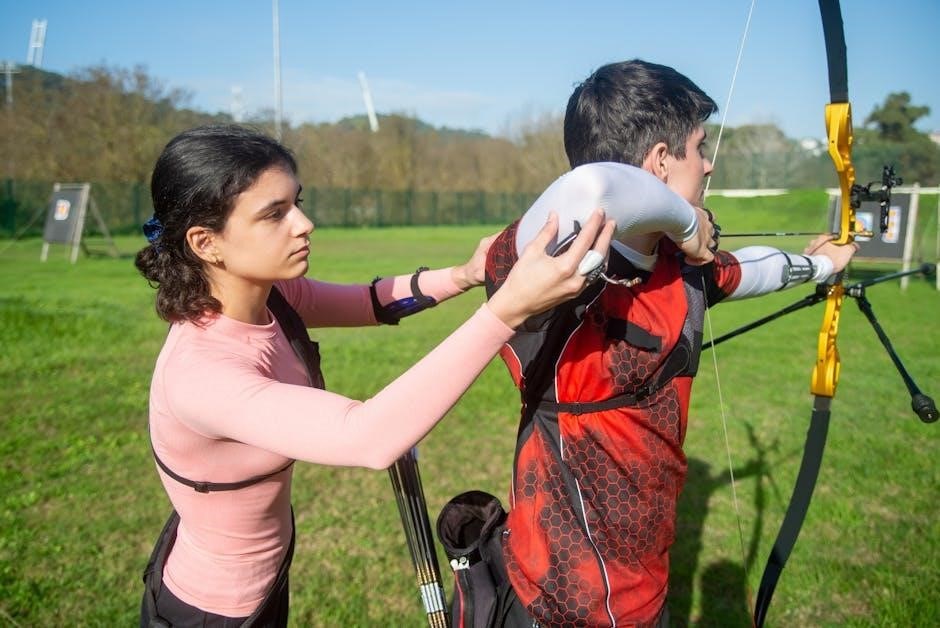The Yamaha R-S202 manual provides comprehensive guidance for setting up, operating, and maintaining the receiver. It includes detailed instructions for connecting devices, tuning radio stations, and troubleshooting issues. The manual is a valuable resource for ensuring optimal performance and understanding advanced features like Bluetooth connectivity and preset tuning. By following the manual, users can fully utilize the R-S202’s capabilities and enjoy high-quality audio experiences. Proper installation and maintenance tips are also covered to extend the product’s lifespan.
Overview of the Yamaha R-S202 Receiver
The Yamaha R-S202 is a high-quality stereo receiver designed to deliver exceptional sound performance with its advanced circuitry and natural sound technology. It features Bluetooth connectivity, enabling wireless streaming from compatible devices, and a 40-station FM/AM preset tuning system for easy access to favorite radio stations. The receiver boasts a durable brushed aluminum finish, ensuring both aesthetic appeal and longevity. With a power output of 100 watts per channel into 8Ω stereo, it supports a wide frequency response range of 10Hz to 100kHz and a total harmonic distortion of 0.2%, ensuring clear and precise audio reproduction. This receiver is ideal for music enthusiasts seeking a reliable and versatile home audio solution.
Importance of Reading the Manual
Reading the Yamaha R-S202 manual is crucial for maximizing the receiver’s potential and ensuring optimal performance. It provides step-by-step instructions for proper installation, operation, and maintenance, helping users avoid common mistakes. The manual explains how to connect speakers, pair Bluetooth devices, and tune radio stations effectively. Additionally, it details troubleshooting solutions for issues like distorted audio or connectivity problems. Understanding the receiver’s features and settings through the manual allows users to customize their listening experience and maintain the device’s longevity. By following the guidelines, users can enjoy high-quality sound while extending the lifespan of their Yamaha R-S202 receiver.
Key Components of the Yamaha R-S202
The Yamaha R-S202 features a robust design with essential components that ensure high-quality audio performance. Its advanced circuitry design minimizes noise and distortion, delivering clear and natural sound. The receiver includes a built-in Bluetooth module for wireless connectivity, allowing seamless streaming from compatible devices. It also boasts a 40-station FM/AM preset tuner, enabling easy access to favorite radio stations. The brushed aluminum finish adds durability and a sleek appearance. Additionally, the receiver includes a remote control for convenient operation and a sleep timer function for added convenience. These components work together to provide an enhanced listening experience, making the Yamaha R-S202 a versatile and reliable stereo receiver for home audio systems.

Features of the Yamaha R-S202
The Yamaha R-S202 offers advanced circuitry for clear sound, Bluetooth for wireless streaming, 40 FM/AM presets, and a durable brushed aluminum finish, ensuring versatile audio performance.
Advanced Circuitry Design
The Yamaha R-S202 incorporates an advanced circuitry design that ensures high-quality audio reproduction. This design minimizes noise and distortion, delivering a clean and precise sound output. The receiver’s internal components are carefully selected to optimize performance, providing a stable and reliable operation. The advanced circuitry also supports efficient power management, allowing the receiver to maintain consistent sound quality even during extended use. Additionally, the design includes features that protect against interference, ensuring that the audio remains clear and unaffected by external noise sources. This attention to detail in the circuitry makes the R-S202 a robust and dependable choice for music enthusiasts seeking superior audio performance.
Bluetooth Connectivity for Wireless Streaming
The Yamaha R-S202 features Bluetooth connectivity, enabling wireless streaming of audio from compatible devices like smartphones, tablets, and laptops. This convenient feature allows users to enjoy their favorite music seamlessly without the need for cables. The Bluetooth technology ensures a stable and high-quality connection, delivering clear and distortion-free sound. With Bluetooth, users can stream music from popular platforms or personal libraries directly to the receiver. The pairing process is straightforward, and once connected, the R-S202 provides an immersive listening experience. This feature enhances the versatility of the receiver, making it a modern and user-friendly option for music enthusiasts who value wireless convenience and premium audio quality.
40-Station FM/AM Preset Tuning
The Yamaha R-S202 offers a convenient 40-station FM/AM preset tuning feature, allowing users to save and quickly access their favorite radio stations. This feature enhances listening convenience by eliminating the need to manually search for stations each time. With the ability to store up to 40 presets, users can organize their preferred FM and AM stations seamlessly. The receiver provides clear and stable tuning, ensuring high-quality audio reception. The preset function is easy to use, enabling users to save stations with a few simple steps and recall them instantly. This feature is particularly useful for those who enjoy a variety of radio content, from music to talk shows, making the R-S202 a versatile and user-friendly choice for radio enthusiasts.
Brushed Aluminum Finish for Durability
The Yamaha R-S202 features a brushed aluminum finish, which not only enhances its aesthetic appeal but also ensures durability. This premium finish provides a robust exterior, protecting the receiver from minor scratches and wear. The aluminum construction contributes to effective heat dissipation, maintaining optimal performance during extended use. The brushed texture adds a modern and sophisticated look, complementing various home decors. This combination of style and resilience makes the R-S202 a reliable and visually appealing addition to any audio system, ensuring long-lasting performance and a timeless design.

Setup and Installation
Setup involves unboxing, connecting speakers, and pairing Bluetooth devices. The manual guides through initial connections, ensuring proper installation for optimal performance. Follow step-by-step instructions carefully.
Unboxing and Initial Setup
Begin by carefully unboxing the Yamaha R-S202 receiver and verifying all components, including the remote control, power cord, and antenna. Place the receiver on a flat, stable surface away from water and direct sunlight. Connect the power cord to a nearby outlet and ensure proper ventilation for optimal performance. Next, attach the FM and AM antennas to improve radio reception. For Bluetooth pairing, ensure your device is in discovery mode and follow the manual’s instructions to complete the connection. Finally, familiarize yourself with the control panel and remote, and proceed to tune FM/AM stations or pair external devices as needed. Always refer to the manual for specific setup instructions to avoid damage or interference.
Connecting Speakers to the Receiver
To connect speakers to the Yamaha R-S202, ensure they are compatible with the receiver’s output specifications. Begin by identifying the speaker terminals on the rear panel, labeled as ‘Speaker A’ and ‘Speaker B’ for left and right channels. Use high-quality speaker cables to connect the positive terminals on the receiver to the positive inputs on the speakers, and similarly for the negative terminals. Secure the connections tightly to avoid any loose contacts. If using banana plugs, insert them firmly into the appropriate jacks. After connecting, test the speakers by playing audio at a low volume to ensure proper sound output from both channels. Always refer to the manual for specific wiring diagrams and guidelines to prevent damage to the receiver or speakers.
Pairing Bluetooth Devices
To pair a Bluetooth device with the Yamaha R-S202, ensure the receiver is in Bluetooth mode. Turn on your device’s Bluetooth and select “Yamaha R-S202” from the available options. If prompted, enter the passcode “0000” or “1234.” Once paired, the receiver will confirm the connection. For subsequent connections, the device will automatically reconnect when Bluetooth is enabled. If pairing fails, reset the receiver or restart your device. The R-S202 can store up to 8 paired devices, allowing seamless switching between sources. Always ensure your device is within range for a stable connection. Refer to the manual for troubleshooting tips or resetting Bluetooth settings if needed.
Setting Up FM/AM Radio Stations
To set up FM/AM radio stations on the Yamaha R-S202, start by tuning into your desired station using the tuner controls or the remote. Once tuned, press and hold the numbered preset button (1-40) to save the station. The receiver allows storing up to 40 stations (20 FM and 20 AM) for quick access. For optimal reception, adjust the antenna position to minimize interference. Use the remote to navigate through stations or manually fine-tune for clearer sound. The R-S202 also supports automatic tuning for easy station search. Refer to the manual for detailed steps on presetting and switching between stations. Proper setup ensures a seamless listening experience with your favorite FM and AM broadcasts.

Operating the Yamaha R-S202
To set up FM/AM radio stations on the Yamaha R-S202, start by tuning into your desired station using the tuner controls or the remote. Once tuned, press and hold the numbered preset button (1-40) to save the station. The receiver allows storing up to 40 stations (20 FM and 20 AM) for quick access. For optimal reception, adjust the antenna position to minimize interference. Use the remote to navigate through stations or manually fine-tune for clearer sound. The R-S202 also supports automatic tuning for easy station search. Refer to the manual for detailed steps on presetting and switching between stations. Proper setup ensures a seamless listening experience with your favorite FM and AM broadcasts.
Using the Remote Control
The Yamaha R-S202 remote control simplifies operation, offering intuitive access to key functions. Use the power button to turn the receiver on/off and adjust volume with the dedicated +/- controls. The remote allows easy source selection, such as switching between Bluetooth, FM/AM radio, or external devices. Mute functionality is also available for quick audio silencing. Preset buttons enable direct access to saved radio stations, while navigation buttons help scroll through menus or fine-tune radio frequencies. For Bluetooth pairing, use the remote to initiate the process and connect to your device. Battery compartment access is straightforward, ensuring uninterrupted use. Regularly clean the remote to maintain responsiveness. Refer to the manual for detailed remote functions and troubleshooting tips to ensure optimal performance.
Tuning into Radio Stations
Tuning into radio stations on the Yamaha R-S202 is straightforward. Use the remote or front panel controls to select FM or AM mode. Press the tuning button to scan frequencies automatically or adjust manually for precise station selection. Auto-preset allows storing up to 40 stations for quick access. Press and hold a preset button to save your favorite stations. For optimal reception, ensure the provided antenna is properly connected and positioned. Adjust the antenna to reduce interference. Use the remote’s navigation buttons to fine-tune frequencies. The receiver displays station information, making it easy to identify your favorites. Store frequently listened-to stations to enjoy seamless listening. The manual provides detailed steps for tuning and saving stations, ensuring a smooth experience.
Adjusting Sound Settings
The Yamaha R-S202 allows for precise sound customization to enhance your listening experience. Use the remote or front panel controls to adjust bass, treble, and balance settings. The tone control buttons enable fine-tuning of low and high frequencies. Press the “Bass” or “Treble” button and use the volume dial to make adjustments. The “Balance” control lets you shift sound between left and right speakers. For convenient listening, the receiver also features a sleep timer function. Adjustments are displayed on the front panel for easy monitoring. Experiment with settings to achieve your preferred audio balance. These features ensure tailored sound reproduction, catering to diverse musical preferences. The manual provides clear instructions for optimizing sound settings to suit any environment.
Using the Sleep Timer Function
The Yamaha R-S202’s sleep timer function allows you to set the receiver to turn off automatically after a selected duration. This feature is ideal for listening to music or radio before sleep without worrying about manually turning it off. To activate, press the “Sleep” button on the remote control and use the numeric buttons to set the timer (options range from 30 minutes to 2 hours). The display will show the remaining time, and the receiver will power off when the timer expires. You can also cancel the timer by pressing the “Sleep” button again. This convenient feature ensures energy efficiency and enhances user comfort during nighttime use. The manual provides detailed steps for utilizing this function effectively.

Troubleshooting Common Issues

Troubleshooting common issues with the Yamaha R-S202 involves checking connections, ensuring proper setup, and addressing interference. Refer to the manual for detailed solutions and error code explanations.
No Sound or Distorted Audio
If the Yamaha R-S202 produces no sound or distorted audio, check the speaker connections and ensure they are securely attached. Verify the volume is adjusted properly and mute is disabled. Ensure the correct input is selected using the remote or front panel. If issues persist, reset the receiver by turning it off, unplugging it, and waiting 30 seconds before reconnecting. Distorted audio may result from incorrect Equalizer or Tone settings; reset these to default. For persistent problems, update the firmware or consult the manual for advanced troubleshooting steps to restore clear sound quality.
Bluetooth Connection Problems
If experiencing Bluetooth connection issues with the Yamaha R-S202, ensure Bluetooth is enabled on both the receiver and the device. Place the receiver in pairing mode using the remote or front panel. Restart both devices and attempt pairing again. Check for interference from nearby electronic devices and move them away if necessary. Ensure the Bluetooth device is within range and that no obstacles block the signal. If problems persist, reset the receiver by disconnecting power, waiting 10 seconds, and reconnecting. This often resolves connectivity glitches. For further assistance, consult the manual or contact Yamaha support for detailed troubleshooting guidance to restore wireless functionality.
FM/AM Radio Station Interference
Interference while listening to FM/AM radio stations on the Yamaha R-S202 can be caused by nearby electronic devices, physical obstructions, or poor antenna positioning. To resolve this, ensure the antenna is fully extended and placed away from other devices. Move the receiver away from sources of interference, such as TVs, computers, or fluorescent lights. If using an indoor antenna, consider relocating it to a window for better reception. For severe interference, an external antenna may improve signal clarity. Avoid placing metal objects near the antenna, as they can disrupt the signal. If issues persist, refer to the manual for additional troubleshooting steps or adjust the antenna orientation to optimize reception quality.
Understanding Error Codes
The Yamaha R-S202 may display error codes to indicate specific issues. These codes help users identify and address problems quickly. Common error codes include those related to hardware malfunctions, software glitches, or connectivity issues. For example, an “E01” error might indicate a hardware problem, while an “E02” could signal a software issue. To resolve these, users should first power off the receiver, wait a few seconds, and then restart it. If the error persists, check all connections and ensure proper installation. Refer to the manual for a detailed list of error codes and their meanings. Updating the firmware or resetting the device to factory settings may also resolve the issue. Contact Yamaha support if the problem remains unresolved after troubleshooting. Always consult the manual for specific code explanations and solutions to ensure optimal functionality.

Maintenance and Care
Regularly clean the Yamaha R-S202 with a dry cloth to prevent dust buildup. Check for firmware updates to ensure optimal performance. Store the receiver in a cool, dry place when not in use to preserve its longevity and functionality. Proper care ensures sustained high-quality sound and durability over time.
Cleaning the Receiver
Regular cleaning is essential to maintain the Yamaha R-S202’s performance and appearance. Turn off the receiver before cleaning to ensure safety. Use a soft, dry cloth to gently wipe the exterior, removing dust and fingerprints. Avoid using harsh chemicals, liquids, or damp cloths, as they may damage the finish or harm internal components. For stubborn stains, lightly dampen the cloth with water, but ensure it is thoroughly dried afterward. Never spray cleaning solutions directly onto the receiver or its openings, as this could cause internal damage. By following these steps, you can keep the R-S202 in pristine condition and ensure optimal functionality for years to come.
Updating Firmware
Updating the firmware of your Yamaha R-S202 ensures optimal performance and access to the latest features. Begin by checking the current firmware version on your receiver. Visit Yamaha’s official website to download the latest firmware version compatible with your device. Use a USB drive to transfer the firmware file to the receiver. Insert the USB drive into the receiver’s USB port and follow the on-screen instructions to initiate the update. Avoid turning off the receiver during the update process, as this could cause damage or instability. Once the update is complete, restart the receiver to apply the changes. Regular firmware updates help improve functionality, fix bugs, and enhance overall user experience. Always ensure you download firmware from Yamaha’s official website to avoid unauthorized or counterfeit software.
Storing the Receiver Properly
Proper storage of the Yamaha R-S202 receiver ensures its longevity and performance. Always store the receiver in its original packaging to protect it from dust and physical damage. Place it in a cool, dry location, avoiding direct sunlight and extreme temperatures. Avoid storing the receiver in humid environments or areas prone to moisture, as this can damage internal components. Do not stack heavy objects on top of the receiver, as this may cause structural damage. Before storing, ensure the receiver is turned off and all cables are disconnected to prevent corrosion or damage to the ports. Clean the receiver with a dry cloth before storage to remove any dirt or residue. Following these guidelines will help maintain the receiver’s condition and ensure optimal functionality when it is next used.

Technical Specifications
The Yamaha R-S202 delivers 100 watts per channel into 8Ω, with a frequency response of 10Hz to 100kHz and a total harmonic distortion (THD) of 0.2%. It supports FM and AM tuning, ensuring precise and clear audio reproduction across various frequencies.

Power Output and Impedance
The Yamaha R-S202 is designed to deliver exceptional audio performance with a power output of 100 watts per channel into an 8Ω load. This ensures robust and clear sound reproduction, making it suitable for a wide range of speaker systems. The impedance rating of 8Ω is standard for most home audio setups, ensuring compatibility with various speaker configurations. The receiver’s power output is balanced to provide both dynamic and detailed sound, catering to music enthusiasts who appreciate high-fidelity audio. With this specification, the R-S202 can drive speakers efficiently, delivering consistent performance across different genres of music and audio content. This makes it a reliable choice for home entertainment systems seeking quality and reliability.
Frequency Response Range
The Yamaha R-S202 features a frequency response range of 10Hz to 100kHz, ensuring a wide and detailed audio spectrum. This broad range allows the receiver to accurately reproduce low-frequency bass notes and high-frequency treble tones, providing a balanced and immersive listening experience. The extended response at both ends of the audio spectrum enhances the clarity and depth of music, making it ideal for a variety of genres. With minimal distortion, the R-S202 delivers a faithful representation of the original audio signal, catering to audiophiles and casual listeners alike. This specification underscores Yamaha’s commitment to high-fidelity sound reproduction, making the R-S202 a versatile and reliable choice for home audio systems.
Total Harmonic Distortion (THD)
The Yamaha R-S202 exhibits a low Total Harmonic Distortion (THD) of 0.2%, ensuring a clean and accurate audio output. This minimal distortion level translates to a pure and uncolored sound reproduction, free from unwanted artifacts. By maintaining such a low THD, the R-S202 delivers a faithful representation of the original audio signal, preserving the integrity of music and other sound sources. This feature is particularly beneficial for audiophiles who seek a high-fidelity listening experience; The low THD also highlights Yamaha’s engineering prowess in designing components that prioritize sound quality and clarity, making the R-S202 a reliable choice for discerning listeners seeking immersive audio performance without compromise.
Tuning Range for FM and AM
The Yamaha R-S202 offers a wide tuning range for both FM and AM radio stations, ensuring excellent reception quality. With its precise tuning capabilities, users can enjoy clear and stable broadcasts across the entire frequency spectrum. The FM tuning range covers from 87.5 MHz to 108 MHz, while the AM range spans from 530 kHz to 1710 kHz, providing access to a multitude of stations. This broad tuning range allows listeners to explore various genres of music, news, and talk shows with ease. The receiver’s advanced circuitry minimizes interference, delivering crisp and uninterrupted audio. Additionally, the 40-station preset feature makes it convenient to save and quickly access favorite FM and AM stations, enhancing the overall listening experience.

Additional Resources
Access the Yamaha R-S202 manual on Yamaha’s official website for detailed instructions. Contact Yamaha support for further assistance, and explore their official documentation for comprehensive product information.
Downloading the Manual from Yamaha’s Website
To download the Yamaha R-S202 manual, visit Yamaha’s official website and navigate to the “Downloads” or “Support” section. Select the R-S202 model from the product list and choose the appropriate manual version. The manual is available in PDF format and is free to download. Ensure you select the correct language and version for your specific device. Once downloaded, you can access detailed instructions, technical specifications, and troubleshooting guides. The manual is a valuable resource for understanding and optimizing your receiver’s performance. Additional resources, such as firmware updates and supplementary guides, may also be available on the website. Always download from Yamaha’s official site to ensure authenticity and safety.
Contacting Yamaha Support
For assistance with the Yamaha R-S202, contact Yamaha’s customer support through their official website. Visit the “Support” section and access the contact form or call the provided phone number. Additionally, Yamaha offers email support for detailed inquiries. Ensure to have your product model number and serial number ready for efficient assistance. Yamaha’s support team is available to address technical issues, provide troubleshooting guidance, and answer questions about the manual or receiver functionality. For urgent issues, consider reaching out during business hours for faster response. Yamaha’s dedicated support ensures users receive reliable help to resolve any concerns with their R-S202 receiver.
Exploring Yamaha’s Official Documentation
Yamaha’s official documentation offers a wealth of resources for the R-S202 receiver. Users can access detailed product information, troubleshooting guides, and technical specifications directly from Yamaha’s website. The official documentation includes user manuals, firmware updates, and compatibility guides. Additionally, Yamaha provides a FAQ section addressing common queries. The website is user-friendly, allowing easy navigation to find specific information. By exploring these resources, users can deepen their understanding of the R-S202’s features and optimize its performance. Regularly visiting Yamaha’s support page ensures access to the latest updates and enhancements for the receiver, ensuring a seamless and enjoyable listening experience.






























